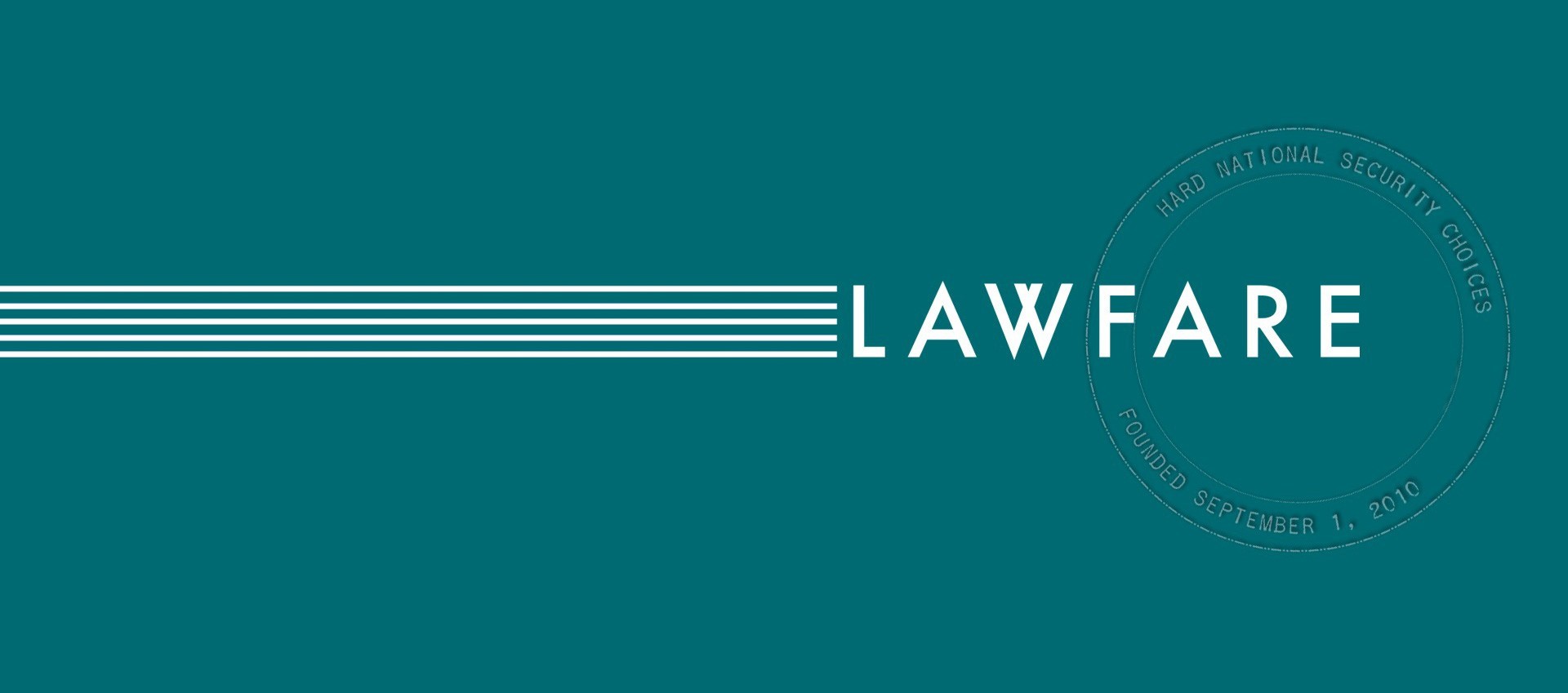Published by The Lawfare Institute
in Cooperation With

Anna Bower, Tyler McBrien, and Katherine Pompilio reported from Donald Trump’s sentencing Friday morning in the New York Supreme Court. Justice Juan Merchan sentenced the president-elect to an “unconditional discharge.”
Benjamin Wittes observed that despite all the criticisms leveled at aspects of the hush money case, Trump’s conviction represents a small victory for the rule of law.
Roger Parloff, Bower, Pompilio, Olivia Manes, and Quinta Jurecic chronicled the ongoing efforts by Trump’s legal team to stop his sentencing in the New York hush-money case and prevent the Department of Justice from releasing the contents of Special Counsel Jack Smith’s final report.
Wittes discussed the approaching conclusion of the criminal cases against Trump, asserting that the hush money sentencing must go forward as a matter of historical record. Wittes further argued that the Justice Department should drop the cases against Trump’s co-defendants in order to make public the contents of Special Counsel Smith’s final report.
Parloff explored the arrest and conviction figures released by the Justice Department for the perpetrators of the Jan. 6, 2021 attack on the U.S. Capitol—and how Trump may go about pardoning some of the defendants after his inauguration later this month.
On Lawfare Daily, Molly Reynolds was joined by Jurecic and Ryan Reilly to discuss two new reports on the Jan. 6 attack on the Capitol, a long-awaited report from the Justice Department’s Inspector General, and a report from House Republicans on the pipe bombs placed at the Democratic and Republican National Committees.
Wittes discussed the difference between memory and history and reflected on the four year anniversary of the Jan. 6, 2021 attack on the Capitol—which some might choose to forget.
On Friday, Jan. 10, Wittes spoke to McBrien, Bower, and Jurecic about Trump’s sentencing in the New York hush money case and the recent developments surrounding the release of Special Counsel Jack Smith’s Final Report in the Jan. 6 and classified document prosecutions.
On Lawfare No Bull, Lawfare published the audio from Trump’s sentencing.
On January 7, Wittes spoke to Jurecic, Renee DiResta, Daphne Keller, Dave Willner, and Kate Klonick about Meta’s decision to end its fact-checking program.
Niharika Vattikonda and Benjamin Kelley outlined the U.S. Court of Appeals for the District of Columbia Circuit’s ruling, which found that the TikTok divest-or-ban requirement of the Protecting Americans from Foreign Adversary Controlled Applications Act does not violate the First Amendment and is sufficiently narrow to fulfill the government’s national security interests.
On January 10, Alan Rozenshtein and Ramya Krishnan joined Kevin Frazier to discuss the Supreme Court oral arguments over the legislation passed by Congress that bans TikTok unless its parent company ByteDance divests from the app.
Peter N. Salib discussed the threat of “rogue AI” amid the release of OpenAI’s most recent model, o3, and two empirical evaluations revealing that AI systems sometimes actively resist human control.
On Lawfare Daily, Jack Goldsmith sat down with Orin Kerr to discuss his new book, “The Digital Fourth Amendment: Privacy and Policing in Our Online World.” They talked about Kerr’s Equilibrium Adjustment Theory, how technological advances have changed courts’ interpretations of the Fourth Amendment, and more.
Asaf Lubin evaluated the U.S. District Court for the Northern District of California’s ruling finding that NSO Group violated U.S. laws and WhatsApp’s terms of service by installing spyware on the messaging app’s servers. Lubin discussed the decision’s potential legal implications as well as the court’s failure to resolve critical questions.
On Lawfare Daily, Eugenia Lostri sat down with Winnona DeSombre Bernsen and Nina Alli to discuss their recent report, “It Takes a Village.” They reviewed insights from several cybersecurity villages and the value they hold for policymakers and the security community.
Ammar Abdulhamid evaluated the challenges facing HTS as they seek to form a new government. Abdulhamid highlighted how the concerns of different ethnic and religious communities cause mutual distrust, which may make a longer transitional period necessary before the country can hold national elections.
Patryk Labuda examined how collective memories of major historical events such as World War II and the Cold War have influenced UN member states’ diplomacy and response to the Russian invasion of Ukraine.
Iryna Marchuk argued that the ICJ’s lack of engagement with Russia and Ukraine’s contrasting historical narratives—particularly relating to events pre-2014—negatively impacted the court’s reasoning in recent litigation between the two states.
On Lawfare Daily, Melissa Stewart joined McBrien to discuss the International Court of Justice’s impending advisory opinion on the extent to which states are accountable for climate change. They talk about the phenomenon of “jurisdictional ingenuity” and the novel ways in which countries are bringing climate disputes to international courts.
On Lawfare Daily, McBrien sat down with Jessica Pishko to discuss her new book “The Highest Law in the Land: How the Unchecked Power of Sheriffs Threatens Democracy.” They discussed the origins of the constitutional sheriff’s movement, the powers of the office, the appeal it has for the far-right, and more.
Christy Lopez analyzed how the Memphis Police Department’s use of “crime suppression” policing contributes to patterns of misconduct as documented in a recent report from the the Civil Rights Division of the Justice Department. Lopez argued that cities can reduce harm by replacing crime suppression policing with problem-solving approaches.
Gia Kokotakis reflected on her studies of terrorism following her experience witnessing the New Year's Day car ramming attack in New Orleans.
And that was the week that was.





